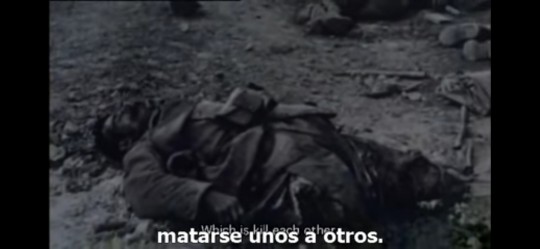#The Mindscape of Alan Moore
Video
youtube
The mindscape of Alan Moore
9 notes
·
View notes
Text
The Mindscape of Alan Moore
Coucou mes p’tites patates mooriennes! Bon, pour celles et ceux qui n’ont que faire de qui fait quoi dans le domaine créatif, et préfèrent juste consommer la soupe, le nom d’Alan Moore ne dira probablement rien. Pour les autres, les avis au sujet du sorcier de Northampton seront certainement quelque peu tranchés. Créateur au caractère entier, quittant les positions enviées de tous dès que sa…

View On WordPress
1 note
·
View note
Video
youtube
“There is some confusion as to what magic actually is. I think this can be cleared up if you just look at the very earliest descriptions of magic. Magic in its earliest form is often referred to as "the art"
I believe this is completely literal. I believe that magic is art and that art, whether it be writing, music, sculpture, or any other form is literally magic. Art is, like magic, the science of manipulating symbols, words, or images, to achieve changes in consciousness. ― Alan Moore
(Excerpt from the documentary: The Mindscape of Alan Moore)”
From Youtube channel WASH YOUR BRAIN: Alan Moore on Magic
One of the few videos of someone talking about magic that sounds very interesting and sensical
Enjoy...
#WASH YOUR BRAIN#Alan Moore on Magic#Alan Moore#Vertigo#magic#witchcraft#magician#wizard#sorcerer#art#gramar#grimmoir#spell#shaman#consciousness#conscience#The Mindscape of Alan Moore#documentary#writer#Watchmen#V for Vendetta#mystery#words#symbols#images
38 notes
·
View notes
Quote
The main thing that I learned about conspiracy theory is that conspiracy theorists actually believe in a conspiracy because that is more comforting. The truth of the world is that it is chaotic. The truth is, that it is not the Jewish banking conspiracy or the grey aliens or the 12 foot reptiloids from another dimension that are in control. The truth is more frightening, nobody is in control. The world is rudderless.
"The Mindscape of Alan Moore" (2003)
5 notes
·
View notes
Text
Thinking about Alan Moore…
Alan Moore seems to possess an integrity that is not understood by creators and fans alike. He has consistently disavowed the translation of his work into other media and has forsaken the fame and monetary rewards that we all know go along with that. The creation of comics as a pitching tool to television and film has become such conventional logic, that Alan Moore’s denials of the fruits of that success are an affront. Renouncing that money means that it was never done for the up-sell to television or film but something else. That is why most contemporary writers don’t show Mr. Moore the respect he deserves; because what he discards as inessential is their entire reason for creating comics. To them, the money and validation not possible in comics except through film and television are the very definition of success. Why would anyone throw that all away? What motivates Alan Moore if not material success and fame? For too many, there would be no other ambition.
I think what’s lost on most contemporary comics creators is the acceptance that they’re creating Art. Even the most stupid infantile comic strip would be made better and more powerful to audience members if it was created with some artistic guiding principles in mind. The biggest of those is having something to say. Comics writers are correct in saying how difficult it is to come up with new material to capture people’s imaginations (and wallets). That’s because they’ve hollowed out their venture into trying to come up with a remixing of a small pool of ideas into a ‘new’ form while always preserving the nostalgic thrill of their sources. It sounds incredibly difficult to try and capture the feeling of things we’ve already loved numerous times by presenting something that also feels new and fresh. You can see that the approach is engineered to cash in on the thrills from an already existing audience while offering them the illusion of novelty. Sell them something they’ve already bought in the guise of something different.
When you listen in on creator conversations at conventions or studio, you may notice that the craft of making this stuff almost never comes up. Instead, they tend to lean on the business side of things like editors, page rates, publishers, press etc. Most writers of comics would be very happy to have Mr. Moore’s career and would salivate at the royalties he’s tossed off. Why, if commercial success is the goal, aren’t the more cynical and craven trying to reverse engineer the gold in those stories? That void that they are afraid to examine requires too much. He’s not made it any secret so there’s no logical answer except that the validation of proving you can do what’s already been done is good enough.
What has Alan Moore said about his approach/philosophy to writing? Two key ideas expressed in the amazing documentary about him called The Mindscape of Alan Moore hold a lot of potential. Here is the first major point about getting in tune with the Self.
The search for the Self with a capital S is understood to be the great work, as being the gold of the alchemists, thought as being the will, the soul, the thing that we have inside us that is behind the intellect, the body, the dreams, the inner dynamo of us, if you like. Now, this is the single most important thing that we can ever attain, the knowledge of our own self and yet there are a frightening amount of people who seem to have the urge not just to ignore the self but actually seem to have the urge to obliterate themselves. This is horrific but you can almost understand the desire simply to wipe out that awareness because it’s too much of a responsibility to actually possess such a thing as a soul–such a precious thing. What if you break it? What if you lose it? Mightn’t it be better to anesthetize it, to deaden it, to destroy it to not have to live with the pain of struggling towards it and trying to keep it pure. I think that the way that people immerse themselves in alcohol, in drugs, in television, in any of the addictions that our culture throws up can be seen as a deliberate attempt to destroy any connection between themselves and the responsibility of accepting and owning a higher self and then having to maintain it.
As far as writing advice goes, this a long way from Story by Robert McKee isn’t it? He seems to be talking almost in spiritual terms of getting in touch with something deep within ourselves; something that the common culture denies and supplants with meaninglessness. Rather than providing the kinds of distractions from that higher investigation, Alan Moore is suggesting we do exactly the opposite of what our society encourages; seek the universal within yourself and recognize it in each other. If we’re to bring it back to writing this quest for the higher self is very much like the hero’s myth. The hero mush leave the comforts of normal society to brave dangers in search of a greater understanding/reality. When that has been achieved by the hero through great sacrifice and struggle, he goes on to sell that idea for as much money as possible to Hollywood, right? No, the hero takes that higher understanding and brings it back to to collective to transform consciousness and society.
What the writer has learned from knowledge of the Self is transformed into art that can communicate that message to others. The writer/artist communicates to others their insights from their own journey to better understand themselves and reality. Doesn’t that sound like a working definition of Art? To take experience and share it for growth of all.
In latter times I think the artists and writers have allowed themselves to be sold down the river. They have accepted the prevailing belief that art and writing are merely forms of entertainment. They are not seen as transformative forces that can change a human being, that can change a society. They are seen as simple entertainment, things with which we can fill twenty minutes, half an hour while we’re waiting to die.
It is not the job of artists to give the audience what the audience wants. If the audience knew what they needed, then they wouldn’t be the audience, they would be the artists. It’s the job of artists to give the audience what they need.
I see the role of artist as mere entertainer to be a dead end and a product of the sort of diminishing returns inevitable when trying to pass off tired fictions as something new. I’ve illustrated enough series to see this logic at work and how it fails to pass on a meaningful spark of inspiration. It’s as though the creators of contemporary comics keep forcing their formulations for commercial success but fail to adjust them when they dry up. By looking within yourself, you understand that what stirs your soul is not that different than what stirs the souls of your audience. The art you make to help your Self’s journey can help others and that’s the REAL role of art; to contribute to the overall evolution of consciousness.
#Writing#The Self#Alan Moore#The Mindscape of Alan Moore#Comics#Consciousness#The Hero's Journey#The Hero with a Thousand Faces#Joseph Campbell
2 notes
·
View notes
Text
The Mindscape of Alan Moore (2003)
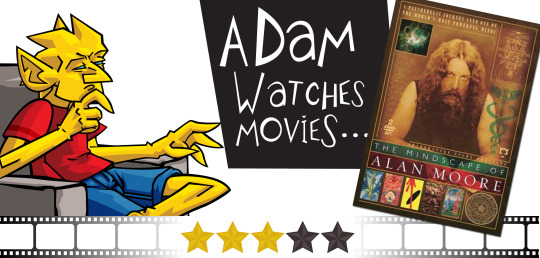
You've read Watchmen, Swamp Thing and V For Vendetta. You made it all the way through From Hell and now rightfully place Alan Moore as one the greatest writers in comic book history. “I’ve got to know more about this guy!” you think as you make your way through the racks of DVDs for sale when you stumble upon this title The Mindscape of Alan Moore. "Holy crackerjacks! I bet he’s got all kinds of insight on the medium of comics and I’ll get new perspectives on his works!" Hold on. Take a look at that tagline on the cover: “A psychedelic journey into one of the world’s most powerful minds”. If you choose to venture into this documentary, prepare yourself for long interviews in which he briefly touches on his life and his career in the comic book industry, but dives deep into his thoughts on magic, modern society, and philosophy.
There are points in this film where Alan Moore is fascinating. Even if you don't quite buy into what he's saying, he makes some enlightened points. Particularly thought-provoking is his comparison of art to magic. Images and words are like ingredients or runes that, when arranged in the correct order are able to destroy (or I suppose, empower) someone in the same way that a fairy-tale curse could. A clever satire or caricature can change the way you think about someone, even yourself. If it’s truly great, the image or words will live on even when the subject is long gone and becomes a piece of history, making them the subject of jokes long after they’re dead. It's no ordinary mind that comes up with those kinds of ideas.
It should be noted that for every profound thought, there’s another that’s simply confusing or not particularly interesting. This is an interview with a man who never wanted fame, and at times it's as if he's playing a joke on the director by being cryptic and portraying an exaggerated version of what imagine Alan Moore as a dirty-looking, partially loony writer who isn’t really interested in his own works once they’re over, dislikes film and society, and is more concerned with the theoretical than real life. Moore does cover his childhood and talks briefly about five of his works: V for Vendetta, Watchmen, From Hell, The Lost Girls (which was not yet released at the time) and Swamp Thing. None of what he says about the books is particularly insightful or revelatory, unfortunately.
The bulk of this narrative concerns Moore talking to us about magicians and repeating the word “shaman” to convince us that things were a little rosier before civilization was firmly established. Unless you're already subscribed to the same train of thought, I fear that you'll emerge from the film disappointed. It's revelatory to get a glimpse of how the man's thoughts spin, but can also be difficult to sit through, even at a mere 78 minutes.
I’ve you’ve heard Alan Moore’s theories about philosophy and magic and it sounds like it makes so much sense that you can’t believe everyone isn't already subscribed, this film will be a new favorite. Even if you aren't, there are some illuminating theories/thoughts sown. I recommend it, even though I dismissed large chunks of The Mindscape of Alan Moore as hippie nonsense. (On DVD, July 26, 2014)

#the mindscape of alan moore#alan moore#mindscape of alan moore#mindscape of alan moore movie review#mindscape of alan moore review#movies#films#reviews#movie reviews#film reviews#2003 movies#2003 films#DeZ Vylenz#watchmen#swamp thing#v for vendetta#the lost girls#from hell
7 notes
·
View notes
Photo
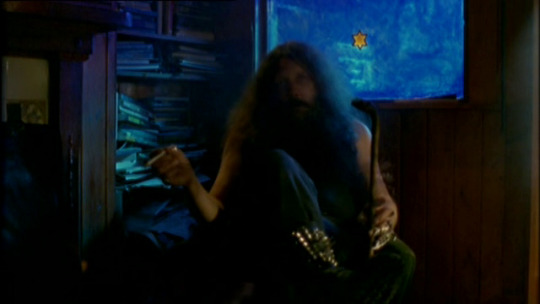
The Mindscape Of Alan Moore (2003) Dez Vylenz.
0 notes
Video
youtube
Déjà avant même que je commence à pratiquer, j’étais fasciné.e par Alan Moore et sa vision de la magie, que j’ai pu découvrir alors sur Arté à l’époque dans une série documentaire qui lui était consacrée, intitulée “The Mindscape of Alan Moore”.
Alan Moore, c’est ce vieux britannique excentrique (pléonasme ?) au regard perçant et à la crinière hirsute, plus connu en tant qu’écrivain et scénariste de comics tels que Watchmen ou V pour Vendetta, pour ne citer qu’eux.
Il se décrit lui-même comme magicien, et certains de ses propos m’ont amené à beaucoup réfléchir sur le concept même de magie.
“Le problème avec la magie, étant à bien des égards une science du langage, c’est que vous devez faire très attention à ce que vous dites, parce que si soudainement vous déclarez être un magicien, sans aucune connaissance de ce que cela implique, alors un jour vous êtes susceptible de vous réveiller et de découvrir que c’est exactement ce que vous êtes.″
Alan Moore pointe ici par ce simple exemple (non sans humour d’ailleurs) l’importance du langage dans la magie. Ce que vous dites, vous le devenez - il en va de même quand vous vous répétez des pensées négatives sur vous-même, petit à petit elles vont impacter votre vision de vous et votre vie.
Le langage est puissant, il agit sur l’esprit, le sien, celui des autres, et savoir l’utiliser est une arme redoutable (et redoutée, c’est pourquoi les écrivains, philosophes et artistes sont aussi persécutés dans les régimes dictatoriaux).
Dans des cultures plus anciennes, et même celles encore présentes où un chamane y fait toujours office, on part du principe que n’importe qui peut maudire une tierce personne, ou la bénir, rien qu’avec ses paroles, d’où l’importance de “rouler sa langue sept fois dans sa bouche avant de parler”.
On retrouve aussi le pouvoir de l’auto-détermination via le langage.
“La Magie dans sa forme la plus ancienne a souvent été dénommé comme ‘L’Art’. [...]
L’art est, comme la magie, la science de manipuler des symboles, mots ou images pour réaliser des changements dans la conscience. [...]
Un grimoire par exemple, the book of spells, est simplement une manière édulcorée de dire la grammaire. “To cast a spell (jeter un sort) is simply to spell” (épeler), de manipuler les mots pour agir sur la conscience des gens.″
Pour Alan Moore, l’art et la magie sont des concepts interchangeables, ils évoquent la même chose, fonctionnent de la même manière : agir sur sa conscience et donc modifier le monde autour de soi.
J’aime sa façon de désacraliser et décortiquer la magie pour pointer du doigt son essence même : manipuler les mots et symboles, en jouant même sur la polysémie du mot “spell” en anglais, d’où le fait que je n’ai pas traduit toute sa phrase, pour ne pas la dénaturer.
En partant de son analyse, il est donc naturel que l’artiste et l’écrivain soient, pour Alan Moore, les choses les plus proches dans notre monde contemporain de ce qu’on pourrait considérer comme un chamane.
“Ce n’est pas le travail des artistes de donner à l’audience ce qu’elle veut. Si l’audience savait ce dont elle avait besoin, alors elle ne serait plus l’audience, elle serait l’artiste. C’est le travail des artistes de donner à l’audience ce dont elle a besoin.″
L’artiste et le mage sont des rôles interchangeables pour Alan Moore. Il y a quelque chose de très “Chaos Magick” dans sa vision des choses, et assez dystopique aussi : avant cette citation, l’écrivain déplore que les chamanes modernes soient devenus les publicitaires, et leurs paroles magiques soient devenus les jingles qui passent à la télévision, alors capables de faire penser à des milliers de personnes dans le même pays les mêmes mots au même moment. Un pouvoir utilisé selon lui pour anesthésier les esprits plutôt que de les éveiller.
L’art et l’écriture sont devenus pour nos sociétés contemporaines des moyens de divertissement, et ne sont plus vus comme des forces transformatrices qui peuvent changer un être humain, voire même la société. La magie a donc ce rôle d’acteur du changement, et non de simple objet de distraction.
“Quand on exécute la volonté de notre vrai Soi, on est inévitablement en train d’accomplir la volonté de l’univers. [...]
Aussi loin que l’on fait la volonté de l’univers, alors il est impossible de faire quoique ce soit de mal.”
La connaissance de soi est un très long chemin, l’oeuvre d’une vie toute entière parfois, et aussi une étape cruciale de la voie du mage. Faire taire l’égo, se dépouiller peu à peu de tout ce qui a été élaboré par dessus son identité et qui la rattache à des constructions sociales et extérieures, partir à la rencontre de son vrai Soi (son Soi Supérieur/Higher Self comme on le retrouve parfois), prendre conscience de sa propre dimension divine intérieure. As above, so below.
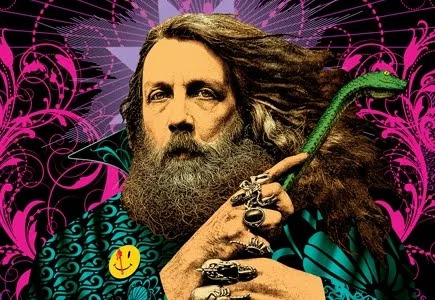
Cet article est déjà très long ;_;
Je vous laisse découvrir seul-e-s le reste de la vidéo, avec des réflexions plus poussées sur le Soi, le monothéisme, le chamanisme, la philosophie alchimique...
Bien sûr, gardez à l’esprit que ce n’est là que la vision subjective d’un individu en particulier, et si j’y ai trouvé écho pour contruire les piliers de ma propre pratique, rien ne vous engage à en faire de même ^^
Je partage cette vidéo avant tout car c’est une très bonne amorce philosophique sur la magie et son intégration à nos sociétés contemporaines et très cartésiennes. Le confinement est un bon moment pour s’exercer à penser et repenser tous ces concepts ;)
Portez-vous bien !
#alan moore#magic#witchblr#occultisme#magie#sorcellerie moderne#sorcieres en confinement#Histoire de la Magie#french witch
14 notes
·
View notes
Text
Documentales, 26
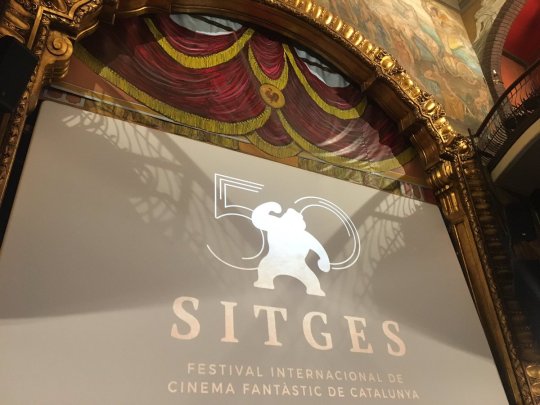
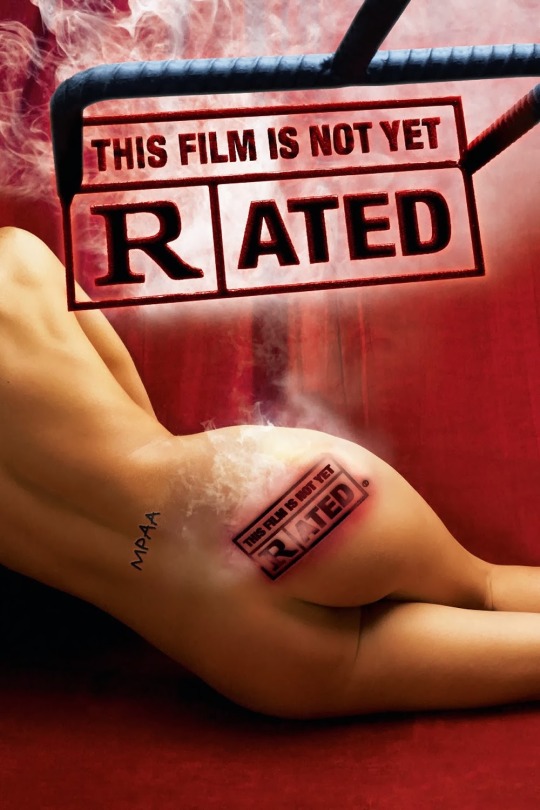
‘Los censores de Hollywoo’ ('This film is not yet rated’), Kirby Dick, 2006, VOSE.
Frustrado por el modo en que la Motion Picture Association of America (MPAA) otorga la clasificación por edades en Estados Unidos para ver una película, un realizador contrata un detective privado para llevar a cabo un experimento.
'This film is not yet rated’ cuestiona el arcaico y puritano sistema de dicha clasificación otorgado por este poderoso organismo oficial fundado en 1922. Una determinada clasificación puede hacer que la vida comercial de una película se vea en peligro, pues puede limitar la entrada al cine de mucha gente.
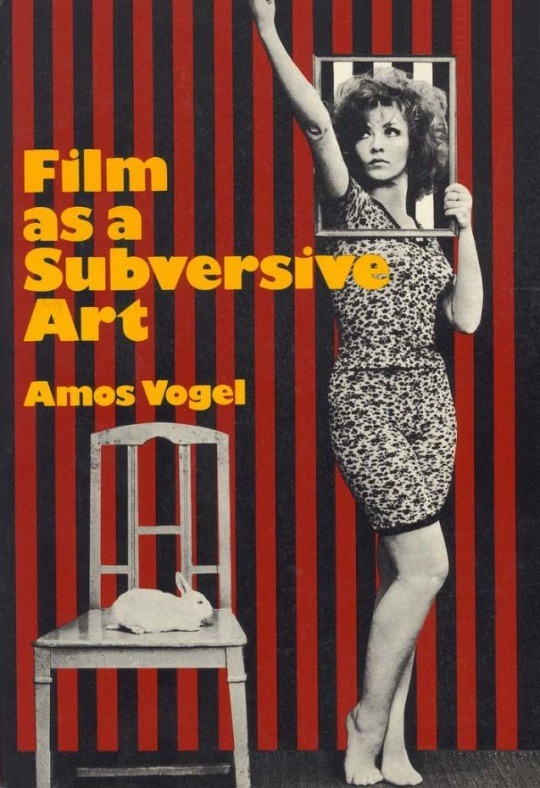
‘Film as a subversive art: Amos Vogel and cinema 16’, Paul Cronin, 2004, VO.
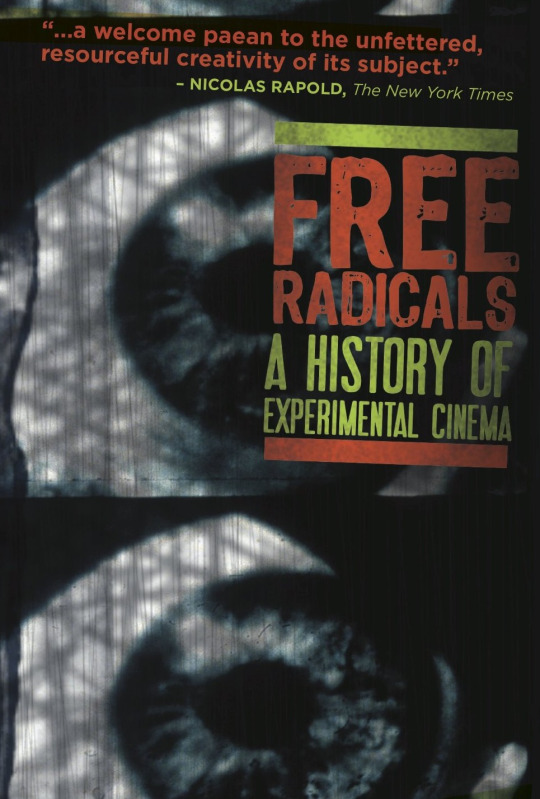
‘Free radicals: A history of experimental film’, Pip Chodorov, 2010, VOSE.
"These were homemovies. Then my dog peed on them. I though it looked cool”.
Así empieza la narración de un documental muy personal, cargado de instantes brillantes, imágenes abstractas, texturas granulosas y declaraciones delirantes.
Estructurado en torno a cuatro películas clásicas del cine de vanguardia como son ‘Rhythmus 21’, Hans Richter, 1921, ‘Rainbow dance’, 1936 y ‘Free radicals’, 1958 de Len Lye, junto a ‘Recreation’, Robert Breer, 1956-57.
Comentado con una voz en off en primera persona, empieza con un tono autobiográfico para proseguir hacia un carácter más o menos ortodoxo, mediante entrevistas a cineastas, imágenes de archivo y múltiples fragmentos de películas asombrosas.
Su director, Pip Chodorov, fundador de la distribuidora Light Cone, director del sello editorial Re-Voir y webmaster del foro Frameworks, presenta un documental dedicado a la historia del cine experimental estadounidense avant garde, desde 1921 hasta los inicios de los años sesenta. Muestra desde un punto de vista personal y pedagógico las vicisitudes de una serie de cineastas que hicieron florecer toda una escena cinematográfica profundamente singular.
Nacido durante el flower power en un entorno familiar peculiar, su madre era pintora y su padre realizador y productor de televisión interesado por el cine experimental, Chodorov absorbió desde pequeño la efervescencia cultural que le rodeaba. Recuperando el material familiar de aquella época, reivindica la libertad de la imagen en movimiento y sus estéticas novedosas radicalmente inusuales.
Incluye un buen número de entrevistas a primeras figuras del panorama internacional del género, como Hans Richter, Robert Breer, Jonas Mekas, Stan Brakhage, Peter Kubelka, Ken Jacobs, Michael Snow, Stan Vanderbeek y Nam June Paik entre otros, e incluye la presencia de Pip Chodorov, Stephan Chodorov, Maurice Lemaître, Len Lye, John Mhiripiri, M.M. Serra y Andy Warhol. Entre ellos sobresale el padre del director y embrión del documental, Stephen Chodorov, que durante los años 70 dirigió un programa de televisión pública sobre artistas del cine de vanguardia.
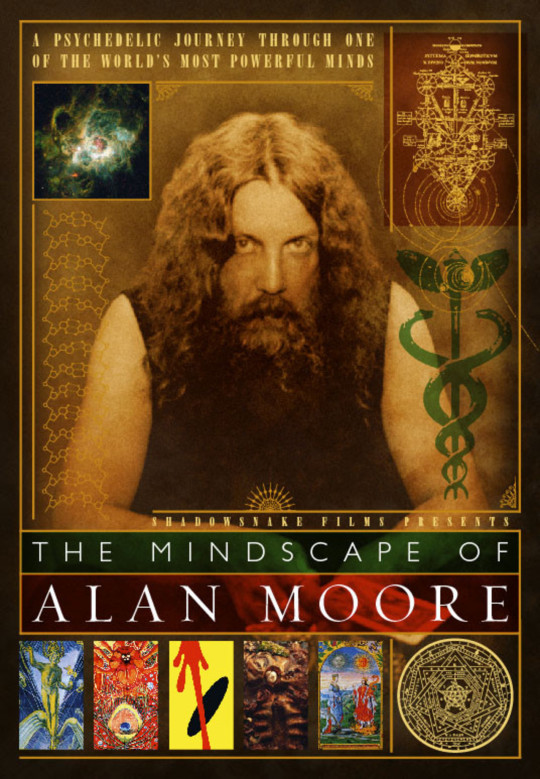
‘La mente de Alan Moore’ (’The mindscape of Alan Moore’), Dez Vylenz, 2003, VOSE.
Trata sobre el mítico guionista de cómics, algunos de ellos adaptados al cine, autoproclamado mago Alan Moore, que despliega en primera persona su personal cosmogonía vital.
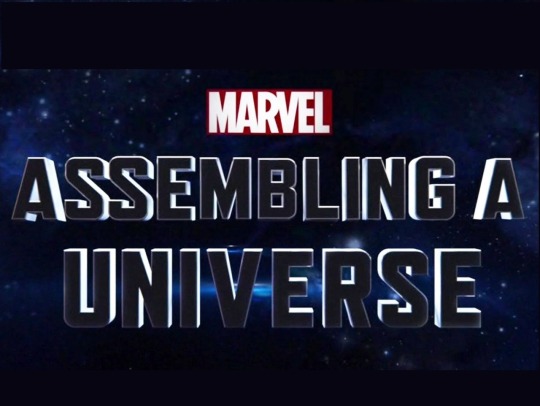
‘Marvel Studios: Assembling a Universe’, Brian Tyler, 2014, VOSE.
Presenta la historia de Marvel Studios y de su universo cinemático ofreciendo entrevistas exclusivas con miembros del reparto de sus películas, cortometrajes y de la serie 'Agents of S.H.I.E.L.D', junto con clips de los futuros films de la compañía.
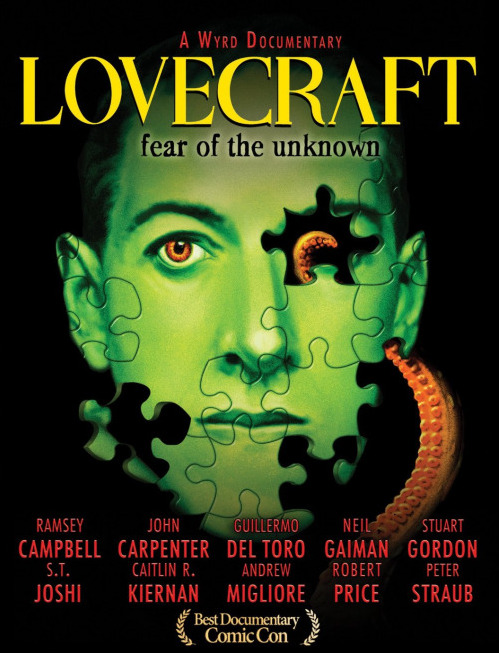
Howard Phillips Lovecraft.
‘Lovecraft. Miedo a lo desconocido’ (’Lovecraft. Fear of the unknown'), Frank H. Woodward, 2008, VOSE.
'Stuart Gordon on Lovecraft', VOSP.

‘Is the man who is tall happy?: An animated conversation with Noam Chomsky’, Michel Gondry, 2013, VOSE.
Curioso documental realizado por el cineasta Michel Gondry que incluye entrevistas con el lingüista, filósofo y activista Noam Chomsky y está realizado enteramente con animación tradicional.
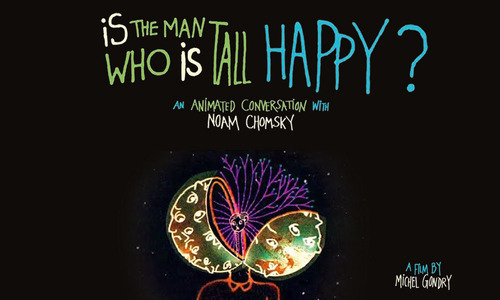

‘El celuloide oculto’ ('The celluloid closet’), Rob Epstein, Jeffrey Friedman, 1995, VOSE.
Trata sobre la homosexualidad en el cine dirigido por el experto documentalista Rob Epstein, poseedor de dos Oscar, y Jeffrey Friedman, cineasta, productor y ayudante de montaje de 'Toro salvaje’.
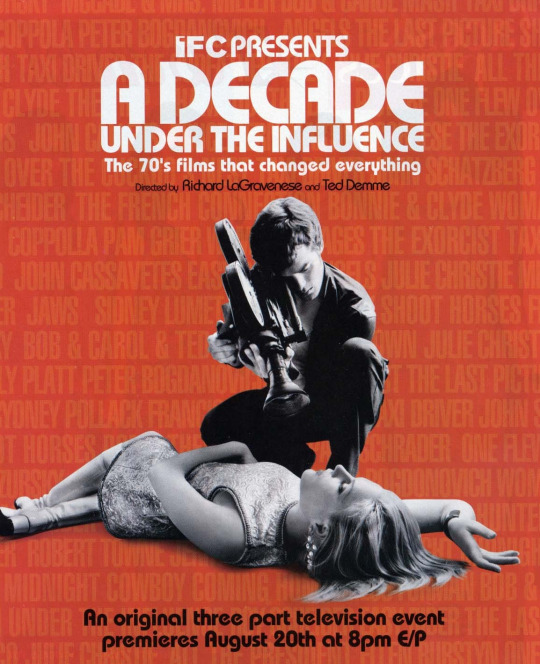
'A decade under the influence', Ted Demme, Richard LaGravenese, 2003, VO.
Trata sobre el mundo del cine en la década de los setenta, cuando desapareció el sistema de estudios y se produjo un cambio radical en la manera de contar historias. Durante aquellos años directores americanos casi todos bajo la influencia de directores extranjeros como Godard, Antonioni, Kurosawa o Fellini, revolucionaron el mundo del cine para siempre.
Con la presencia de Martin Scorsese, Francis Ford Coppola, Robert Altman, Peter Bogdanovich, Julie Christie, Dennis Hopper, Sidney Lumet, Milos Forman, Robert Towne, Sydney Pollack, Paul Schrader, William Friedkin, Roger Corman, Roy Scheider, Jon Voight, Paul Mazursky, Richard LaGravenese, Jack Nicholson, Paul Thomas Anderson y Steve Soderberg entre otros.
3 notes
·
View notes
Video
youtube
É sempre uma aula ler um roteiro de uma HQ do Alan Moore, mas estou ainda mais interessada no que ele pode falar fora das histórias publicadas pelas editoras. Para quem ainda não viu esse documentário vale muito a pena, mesmo que você como eu não tenha nem um dedinho dentro de superstições, porém é apaixonado pela forma como a arte pode afetar a nossa mente e realidade fica a dica.
0 notes
Video
youtube
Alan Moore - Interview - Mindscape & Mysticism
14 notes
·
View notes
Photo

#metacineclub: The Mindscape of Alan Moore
La película de esta semana viene muy a cuento de lo que ayer hablé en la mesa redonda Lo maravilloso y lo fantástico a escena (puedes verla en vídeo siguiendo este enlace), sobre la magia y el arte, y la definición que Alan Moore da sobre el tema. De hecho, la cita de Moore que usé en mi presentación está sacada de este documental, The Mindscape of Alan Moore, dirigido por Dez Vylenz en 2003.
Alan Moore es una de las mentes creadoras más interesantes de las últimas décadas. Guionista de cómics, escritor, cineasta, performer y autoproclamado mago, Moore explica en primera persona, a través de una fascinante entrevista, su cosmología personal y vital. Un repaso a la vida e inquietudes de un librepensador contemporáneo que encandila o incomoda, pero que nunca deja indiferente a nadie.
No es un documental fácil de conseguir. Lo puedes encontrar de importación desde Estados Unidos, pero si quieres subtítulos en español, tendrás que acudir a YouTube.
Sinopsis:
Alan Moore presenta la historia de su desarrollo como artista, comenzando por su infancia, continuando con su trabajo como guionista de cómics y su impacto en ese medio, y terminando con su creciente interés personal por la magia.
Te gustará si…
Has leído los cómics de Moore y tienes interés en la vida y el desarrollo de uno de los más grandes guionistas de la historia del medio.
Tienes interés en el pensamiento divergente de un intelectual librepensador con unas fuertes opiniones sobre la vida, la realidad, la política y la sociedad, el mito y la magia como arte para el cambio de la conciencia a través de la voluntad. Estés de acuerdo o no con él, sus opiniones son dignas de tener en cuenta.
¿Y tú? ¿Has visto The Mindscape of Alan Moore? ¿Qué te ha parecido? ¿Cuáles son tus documentales favoritos sobre artistas y ocultistas? Hablemos sobre ello en redes sociales con el hashtag #metacineclub.
0 notes
Photo

Inutile d’adhérer à WITCH. Si vous êtes une femme et que vous osez regarder à l’interieur de vous-même, alors vous êtes une sorcière. Manifeste de WITCH (Women’s Conspiracy from Hell) New York 1968
La sorcière incarne la femme affranchie de toutes les dominations, de toutes les limitations; elle est un idéal vers lequel tendre, elle montre la voie.
Des siècles de haine et d’obscurantisme semblent avoir culminé dans ce déchaînement de violence, né d’une peur devant la place grandissante que les femmes occupaient alors dans l’espace social.
Je crois que la magie est de l’art, et que l’art est littéralement de la magie. L’art comme la magie, consiste à manipuler les symboles, les mots ou les images pour produire des changements dans la conscience. En fait, jeter un sort, c’est simplement dire, manipuler les mots pour changer la conscience des gens, et c’est pourquoi je crois qu’un artiste ou un écrivain est ce qu’il y a de plus proche, dans le monde contemporain, d’un chaman. The mindscape of Alan Moore
Les femmes qui créent autre chose que des enfants restent considérées par beaucoup comme dangereuses.
Etre sorcière, c’est être subversive à la loi. C’est inventer l’autre loi.
Sorcières la puissance invaincue des femmes Mona Chollet
1 note
·
View note
Text
Repperio 7/9/18

My Many Moons Books appeared in the mail today, looking forward to connecting with the Moon.
My [daytime] Artemisia Ointment from Sarah Anne Lawless should be arriving soon (I own her Four Nightshades - Solanaceae Ointment for pain in my foot, has been a life saver).
My Anxiety tinctures will be ready on the New Moon. Using brand was a VERY good move, much thanks to r/herbalism.
Inspiration
Alan Moore’s Mindscape
(recommended by Sarah Anne Lawless’s twitter @ forest) Mushi-Shi NETFLIX WIKI
Elementaal and Cosmic Witch Spotify Playlists by Tres Blase. of @fuckindiva
Readings
Earth, Sea and Sky [Transition] Mediation by @thehagandthestag
simple and beautiful meditation
Many Moons July-December Edition by Modern Woman
Shops
Ritual Craft -
really want to try their Botanical Incense and they have a nice stock of different and independent artisans and Witches. Ms. Lawless is stocked by them and that’s how to came to find them.
FeyHerbaOrganics
Came highly recommended via the r/witchcraft. Her Empath Sage Soap and Oil look so good.
Deity: Hekate
Witchcraft with Goddness Hekate @cuimhnne
Wish List
WYRDWOOD: Essays Toward an Understanding of the Folkwitch by Eldred Wormwood
very big fan of the @skepticaloccultist blog and looking forward to trying to obtain a copy of this.
Seventh Sphere Lenormand Deck
Cutting the Cord by Marcella Kroll
#witchblr#ritualcraft#@skepticaloccultist#mushi-shi#sarahannlawless#witchy#waxing moon#folkwitch#moon#hekate#witch music#herbalism#etsy#me
2 notes
·
View notes
Text
“The main thing that I learned about conspiracy theory is that conspiracy theorists actually believe in a conspiracy because that is more comforting. The truth of the world is that it is chaotic. The truth is, that it is not the Jewish banking conspiracy or the grey aliens or the 12 foot reptiloids from another dimension that are in control. The truth is more frightening, nobody is in control. The world is rudderless.”
"The Mindscape of Alan Moore" (2003)
1 note
·
View note


